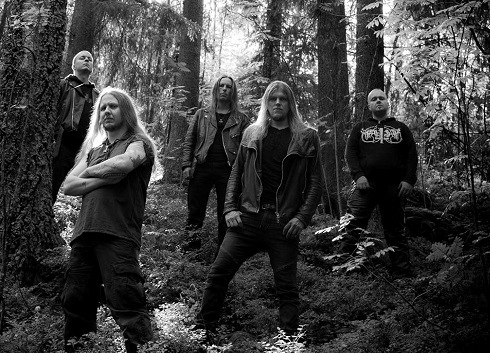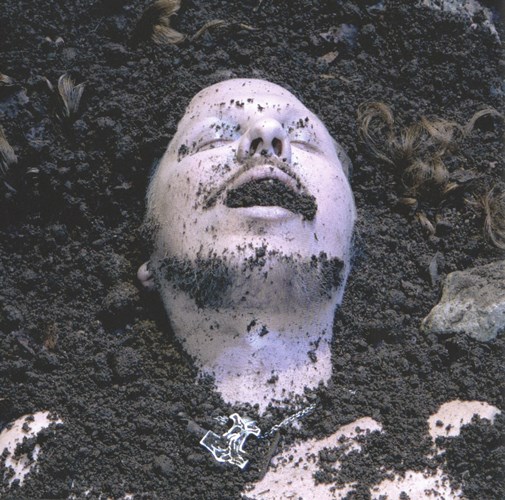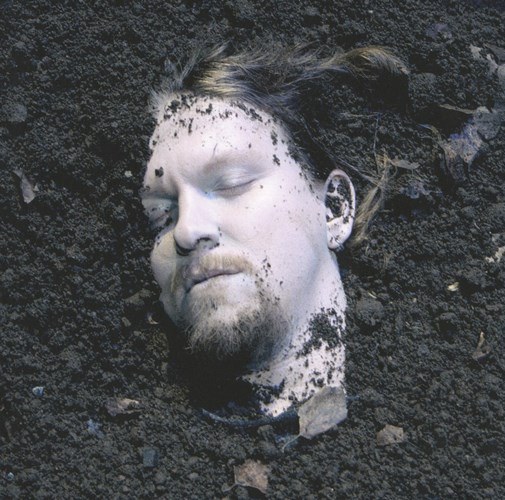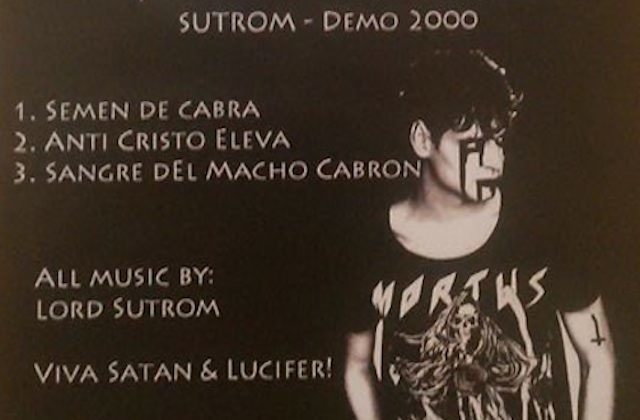SOURCE
It’s been a year since the release of “Jumalten
Aika”, and Heavymusic team came back to Helsinki for having a chat with
the guys from Moonsorrow again. The secrets of promo photos, old Finnish
traditions, the end of the world and more — have a read our exclusive
interview!

So how was the tour going for you?
Ville: Excellent!
Mitja: Yeah, very good! It’s nice to tour in Finland as we
didn’t do a proper Finnish tour, just played some festivals, and then we
started touring in Europe when the album [Jumalten Aika] was released,
so finally we’ve been touring a little bit more in Finland.
Have you received any kind of special treatment from the homeland fans? Is there any difference in mentality?
Ville: I don’t know if it’s different, it was just really
good. We got a very good response from the audience, maybe it’s because
we don’t do this so often they don’t get tired…
Or they just miss you so much because you usually play in other countries!
Ville: I don’t know why actually.
We’re sitting here like we did almost a year ago. The same place, nearly the same time…
Mitja: Right!
…but at that time we didn’t have a chance to look at
“Jumalten Aika” booklet. Now after taking a closer look we can say that
your promo pictures have definitely caught our attention. Can you tell
us about its making process?
Ville: It was Markus’s idea. He wanted to do this maybe
because he doesn’t like us that much *laughs* He wants us to suffer. It
was really painful to do. In a way it was fun. How did we do it?
Mitja: We were in theatre with some kind of a pool of mud and dirt.
So you were in a closed space, not outside, right?
Mitja: Yeah, we were indoors.
Ville: We weren’t really at the graveyard or anything.
*everybody laughs*
Mitja: It was fucking cold at that time of the year, so being
outside and trying to dig ground for the hole big enough for the guys…
Markus doesn’t dislike you that much!
*everybody laughs*

How did you feel with all that ground in your hair and even in your mouth?
Ville: Dirty.
Was it tasty?
*everybody laughs*
Ville: I was the one who had the dirt in my mouth, so I can
tell you it wasn’t especially tasty. I wouldn’t use that word to
describe it.
You wouldn’t repeat that, right?
Ville: No, probably not.
*At that point Mitja shows us a photo of Markus lying on the ground in the pool half-naked*
Mitja: So there’s Markus.
He is trying to be so stoic…
Ville: He doesn’t have to try to be stoic.
Well, let’s move to the next question. Using of folk
melodies has always been a strong feature of your music. Do you in some
way rearrange any old Finnish melodies or do you write your own stuff?
Ville: We’d like to think that all those melodies are
originals, and that we’ve come up with them. Of course, there’s only a
certain number of ways how you can combine these a few notes that are
used in traditional Scandinavian music, so every melody sounds a bit
like the next melody in a way, but we don’t use melodies that are known
as traditional or anything. We try to come up with the new ones.
The new ones sound like the old ones, and it’s really good!
Ok, now I want to ask you about phenomenon which can be called “blood
memory”. It means a special state of mind when you suddenly feel like
traveling back in time and looking on the world with your ancestors’
eyes. Have you ever experienced such a feeling and if yes, what was the
reason for it?
Mitja: A good question. I don’t think I have. I tried to, but I
don’t think it really happened to me. Although many times I try to
depict in my head how things were before and so on, but I haven’t had
any experience like this.
Sometimes when you’re listening to music, you can imagine all this stuff they sing about and sometimes it just happens…
Mitja: Well, when I usually listen to the music I see some kind of landscapes and colors but nothing very concrete.
Ville: When I was writing the lyrics, I really tried to see
the world with my ancestors’ eyes, but of course it’s a bit difficult,
because the surroundings are totally different. Those people didn’t use
to live in the cities, for example. They didn’t have running water or
electricity or anything.
How about escaping to the forest?
Ville: I was doing some inner research in forests and Arctic areas, but that’s a different story.
Ok, it will be the question for the next interview! Do you have any favorite Finnish traditions or customs?
Ville: Drinking.
Mitja: Customs?..
*At that point our interview is interrupted with a loud
“Whee!” from Marko who is riding an equipment trolley driven by one of
the technicians. They say “Oh, you’re having an interview! Sorry!” and
zoom off. Everybody laughs*
Mitja: I would say… Just fishing *laughs* It’s not really a tradition, but…
Ville: It’s not really a tradition, because it was crucial for
quite many people’s living back in those days. You had to fish to get
something to eat. Nowadays it’s just a hobby, because other people fish
for us, we just go to the supermarket and buy that fish, and it’s
actually pretty sad.
The nature has always had a great influence on your music,
if not to say the greatest. What do you think modern people should learn
from the nature?
Ville: Respect.
Mitja: Yeah. Respect and I think it would be good to anybody
to go in the woods by yourself completely alone and stay for a couple of
nights with yourself and nature. It teaches you a lot about yourself
usually.
Ville: And I think people should definitely understand that
even though we have all these big cities, we have these supermarkets
that stock the food for us, we have smartphones and everything, we still
totally and mostly depend on the nature. All these parts that are used
in the smartphones *nods in the direction of smartphones recording the
interview* come from the nature originally. So we’re just kind of
visitors here. If we fuck up the planet, the planet doesn’t care, I
think, but then we fuck up ourselves. People should really understand
that before it’s too late. It’s not supposed to be a lecture or anything
but that’s what just came up to my mind.
You have developed two concepts of the end of the world on
your albums. It will die in the fire or plunge into eternal cold
according to “Hävitetty” and “Varjoina Kuljemme Kuolleden Maassa”
respectively. In your opinion, what will be the real end of the word?
Ville: Stupidity. There are lots of possible scenarios, I
don’t think if it’s actually gonna happen but… It’s not gonna happen
during my life, I hope. People will eventually reeducate themselves.
Mitja: Yeah, people are lucky enough to live until they do,
but I think some asteroid will destroy our planet before we can do it.
So it can be better for us than dying from our own hands…
Mitja: I don’t know if it’s good for anything but... I hope it’s gonna happen soon, maybe tomorrow.
Ville: It would be good for the other life forms on this
planet, if we get rid of ourselves, but I’m not gonna get rid of myself,
I don’t need that. Some things have gone a bit out of hand.

Can you guys compare yourself with any kind of nature phenomena?
Mitja: What do you mean?
Anything like rain, storm, snow, Northern lights… maybe rainbow?
Mitja: *laughs* Ok, we’re rainbows…
Ville: I would like to be a stone. They are quite cool. They don’t really disturb anyone.
Yeah, just lying on the ground…
Mitja: Growing some mold…
*everybody laughs*
Ville: Unless there’s a landslide. Then they disturb quite a lot.
Mitja, what about you? Rainbow was your first answer…
Mitja: No-no-no…
Ville: A unicorn.
Mitja: Yeah, a unicorn. *laughs* No, I would say… mist.
Nowadays many people think it’s important to have a warrior
spirit. With regard to all events which are happening in the world
what’s your opinion about that and do you consider yourself as warriors?
Ville: No.
Mitja: Not really. You need to have some stamina to go through
everyday life, but I don’t value people who are over-aggressive and
take whatever they want.
Well, it’s maybe about defending their own interests and
even overcoming yourself every day, doing something you don’t like to,
but you have to…
Mitja: Yeah, when you need to take stuff in your hands then of
course, not just physically but in general. But I value wisdom more
than being just a fighter.
Ville: I think that’s one of the most important features of
human kind that we actually have, if we want to. We have the ability to
coexist and make compromises that benefit everyone. In theory.
This year marks a centenary of Finnish independence. In
order to commemorate this event one web-site called musicfinland.fi has
made a special playlist which includes one hundred songs of different
Finnish artists who has made bright and lasting international
impression. Unfortunately, no Moonsorrow songs were included…
Ville: I haven’t checked the list.
…so if you could choose one song to be in this list, which song would it be?
Ville: That’s a very good question.
Mitja: I would choose “Tulimyrsky”.
Ville: Yeah, because it’s the longest.
The next question might be a tricky one, but we want you to
be honest. Does Moonsorrow give you enough space for artistic
expression, or do you sometimes feel the need to bring your material to
any side projects?
Ville: So far it has for me. I don’t really feel a need to do
something else. I might do something else now and then just for fun, but
I don’t think Moonsorrow limits my artistic expression.
Mitja: Yeah, we all write all kinds of material and every
material has its place somewhere, not maybe in Moonsorrow, but we want
to write some Lakupaavi [punk/grindcore side project including the
members of Moonsorrow] stuff definitely not under Moonsorrow’s name.
Well, it must be continued!
Ville: But no one knows when.
Mitja: Time is also limited. I find it extremely difficult to
find the time for other projects, and when I do, it’s always battle
against time schedules and stuff.
What kind of projects do you do?
Mitja: Well, I have an old band called Shadow Cut, and we
tried to make some new songs but... it’s impossible to find time for it.
I have some ideas for other projects, but it never happens because
nobody finds time.
Do you at least have any volunteers to help you with this or do you do everything by yourself?
Mitja: Yeas, it’s always with other people. I am not good
enough with the computers to make music by myself, it’so slow. After
seeing how Henri [Sorwali, the mastermind of Moonsorrow] works and how
he can by hands play just drum kit in one minute, and then all the
instruments in few minutes, while I’m still trying to struggle with the
kick drum, not even be able to make a complete drum feel for one song.
So no majesty of Burzum or Falkenbach for you?
Mitja: *laughs* No.
And now we have two special questions. The first is for
you, Ville. Which part of being a musician excites you the most: playing
the instrument, writing the lyrics or doing the vocals?
Ville: All of those, really. I’m in a very different mood in
all those different aspects. When I play the show, I’m in the mood for
playing the show, when I do vocals in the studio, I’m in that mood... I
enjoy all of that in a very different way, I can even compare it, I’m
really sorry.
The second question goes for you, Mitja. According to some
pictures, which have been made during the shootings of “The Home Of The
Wind” documentary, one of your hobbies is sailing. Can you tell us more
about it?
Ville: And sinking ships…
*everybody laughs*
Mitja: Yeah, I own a really old wooden boat with a friend of
mine. It’s great to have it during the summer because Helsinki and the
archipelago around us are really beautiful, and just in a few minutes
you’re in a completely different environment. The ocean is a very
interesting element for me, it’s quite scary and beautiful and all
things at the same time.
Ville: And the constant threat of drowning…
Mitja: Yeah, it’s always there.
Ville: It really puts you in perspective. Man versus the nature.
Mitja: In my case it’s usually man versus the engine.
*everybody laughs*
Is it that old?
Mitja: Yes. It’s from 60s and the engine looks like… it needs a
lot of maintenance this summer, or I’m really gonna drown.
Well, retro style is quite popular nowadays.
MItja: Yeah, they don’t do boats like this anymore.
Ville: I wonder why…
Mitja: I too wonder why, because…
Ville: It’s a nice boat.
Mitja: Yeah, it has spirit. When it’s old and made of wood,
it’s so much better to sleep and better to look at compared to
fiberglass boats.
We have mentioned the making of your documentary. What is its current state, have the shootings already been finished?
Ville: Yeah, the main guy behind it has just mentioned that
now he’s finally finished with all the material. Let’s see!
Mitja: Yeah, it’s in the editing phase right now. He shot the
previous week, they came to Tampere to shoot some material, and I’m
delivering them some old footage as well, so they started to edit it. I
guess they’ve edited some parts already.
Great news! Can’t wait to see the result!
Ville: Me neither.
And which part of the shootings you liked best?
Ville: I only did a couple of interviews so I gave a lot of
background information but I wasn’t filmed during that. Interviews and
all of that were really nice, they had good questions, and obviously
they made a good background work. It was really nice to work with people
who know what they are doing and know what band they are dealing with.
Mitja: It feels sometimes like they know the band better than we do.
Because probably you’ve already forgotten some things.
Mitja: Yeah, yeah.
That’s the fan’s nature, I guess, to know everything and even more…
Mitja: But it was strange when every time they asked me to
talk about paganism, it always started raining. We had a session on an
island, and just when I was starting to answer their questions it
started pouring down like hell. The next day we went on a hill and when I
was just about to start again, it started to rain.
So you aren’t the mist, you’re the rain!
Mitja: Yeah, right.
Or maybe you have some secret knowledge which is not meant to be shared…
Ville: Or it’s so crappy it shouldn’t be shared.
And now here’s our last question for today. What is the most peculiar thing you can’t live without while being on tour?
Ville: Hmm, let me think… *after a long pause* I don’t have any esoteric artefacts in my bunk in the bus…
Mitja: I do.
Ville: I just have my music I listen to, that’s it. I don’t
even have books. I have one book on this tour, but I’ve already read it
before the tour, so I just lent it to other people.
What was the book?
Ville: It was a very short book about an American tour from
the prospective of a roadie. It was really short and I actually read it.
I bought it for the tour, but I actually read before the tour.
Mitja: Well, I don’t really need many things. It happened to
me once when all my possessions were stolen from the bus, with all my
clothes and stuff. I did have my wallet and phone in my pockets, but
everything else I lost. As long as somebody provides you with drinks and
food, then I’ll be fine. It was horrible to be in the US without
clothes, because when we arrived to Hollywood my clothes looked
horrible. It was so dirty after two weeks of touring, and I thought “Ok,
I’m gonna go and buy some new stuff from H&M”, but they were
closed. It was Sunday or just the late hours, and the only shop that was
opened was Armani shop…
Ville: Yeah, in Hollywood.
As long as you have a good credit card you’re fine.
Mitja: I’ve bought Armani sweater and shirts and stuff, and it
cost like hell. It was like a completely different person when I came
back to them.
I bet you made a lot of fun on him!
Ville: He doesn’t really have to dress up differently for us to make fun on him…
So that’s it! Thanks for the answers and have a good show tonight!
Questions: Olga Degteva, Maria Meledyakhina






